Vice President of the Parliament of Montenegro Mr Gvozdenović yesterday received an ODIHR delegation led by the head of the observation mission Mr Tamás Meszerics.
Vice President Gvozdenović pointed out the significance of organising an ODIHR observation mission in Montenegro, in addition to the difficult situation in the world caused by the coronavirus, pointing out that international observation missions and their recommendations have significance for the implementation and constant improvement of the electoral process in Montenegro.
The head of the ODIHR observation mission Mr Meszerics voiced his satisfaction with the cooperation with Montenegro so far and notified the Vice President about his intention to have conversations with various actors of the election process in the following days, aimed at evaluating electoral environment.
Vice President Gvozdenović informed the head of the ODIHR observation mission Mr Meszerics about the work and results of the Committee on Reform of Electoral and Other Legislation which he used to run. He pointed out that good quality legal solutions were adopted, that there was excellent electoral administration and that all parties were participating in the elections, which once more confirmed the existence of good quality of normative framework for administering elections scheduled for 30 August.
Referring to the work of the committee, Mr Gvozdenović informed his interlocutors that it was established upon the initiative of the Democratic Party of Socialists, which in this manner showed its full openness to dialogue and the intention to constantly improve the electoral environment in the country.
Answering the question about the reasons behind the impossibility of an agreement with the opposition, Mr Gvozdenović pointed out that foreign factors did not hide their intentions to interfere in the internal affairs of our country while serving somebody else's interests. He pointed out that Montenegro was a mature country that safeguarded stability and coexistence, as well as that it had mechanisms to deal resolutely with these interferences.
He especially emphasised that the state system was completely stable, organised and operating in accordance with the highest international standards, as well as that it was ready to organise the upcoming elections in such manner, convinced that, along with the ODIHR, the other international partners had seen that as well.
Mr Gvozdenović pointed out that holding elections in this period was a challenging task for the entire Europe, including Montenegro, assuring his interlocutors that Montenegro had ensured that all citizens could go to the polls freely and accordingly exercise their constitutional right without restrictions, but with strict compliance with the measures prescribed by the State Election Commission and the National Coordination Body, from the aspect of protecting the health of all citizens, i.e. voters.
Mr Gvozdenović also referred to specific examples of destructive activities of the opposition, both towards the activists of the Democratic Party of Socialists, aimed at trying to damage their reputation, at which they were failing, and the activities of non-compliance with the measures adopted to protect public health, by which they were trying to damage the electoral environment.
Mr Gvozdenović also referred to a part of the opposition boycotting the Parliament, pointing to the fact that the opposition MPs selectively decided on their participation in plenary sittings and committee meetings. He assessed this approach as politically and socially irresponsible, believing that the public was being sent the wrong message about putting the party before the public interest and receiving salaries and compensations financed by the citizens for the work they had not performed.
As the political director of the largest and state-founding, party Mr Gvozdenović informed that the Democratic Party of Socialists was running its campaign strictly complying with the measures of the National Coordination Body for Infectious Diseases, and that they cared about the health of the citizens at all times, which was not the case with the campaigns of the opposition parties.












